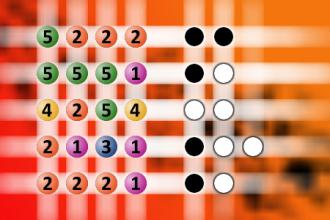What a winning combination?
The computer chose a secret code (sequence of 4 digits from 1 to 6). Your goal is to find that code. Black circles indicate the number of hits on the right spot. White circles indicate the number of hits on the wrong spot.Correct answers: 3
#brainteasers #mastermind

Would you like me to be your friend?
Kathy began a job as an elementary school counselor and she was eager to help.
One day, during recess, Kathy noticed a young girl standing by herself on one side of the playing field while the rest of the kids were playing a game of soccer.
A while later, Kathy walked over to the young girl and offered, "Would you like me to be your friend?"
The girl looked at Kathy suspiciously, then said hesitantly, "Okay, I guess so..."
"Why are you standing here all alone?" asked Kathy.
"Because," the little girl said with great exasperation, "I'm the goalie!"

